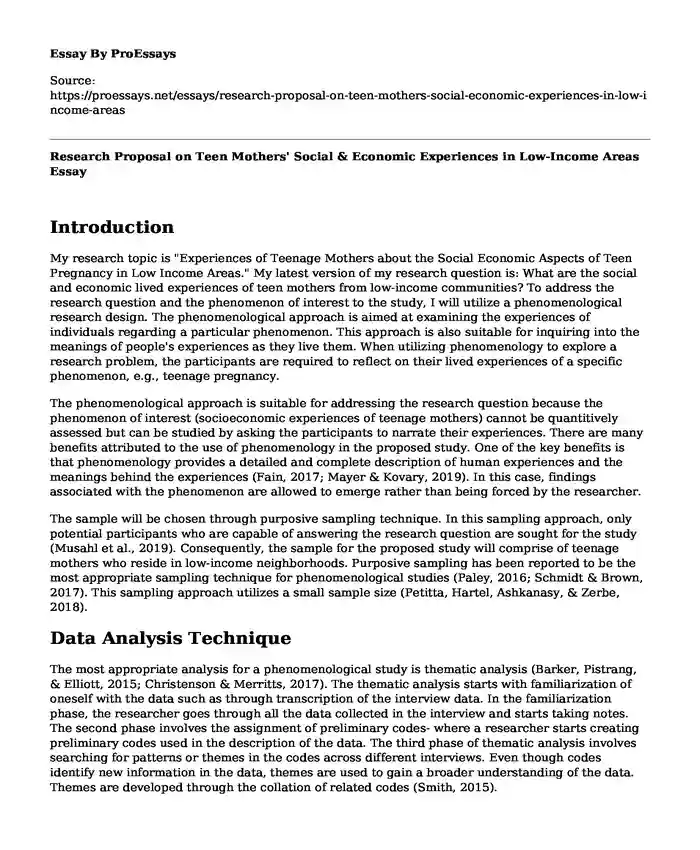Introduction
My research topic is "Experiences of Teenage Mothers about the Social Economic Aspects of Teen Pregnancy in Low Income Areas." My latest version of my research question is: What are the social and economic lived experiences of teen mothers from low-income communities? To address the research question and the phenomenon of interest to the study, I will utilize a phenomenological research design. The phenomenological approach is aimed at examining the experiences of individuals regarding a particular phenomenon. This approach is also suitable for inquiring into the meanings of people's experiences as they live them. When utilizing phenomenology to explore a research problem, the participants are required to reflect on their lived experiences of a specific phenomenon, e.g., teenage pregnancy.
The phenomenological approach is suitable for addressing the research question because the phenomenon of interest (socioeconomic experiences of teenage mothers) cannot be quantitively assessed but can be studied by asking the participants to narrate their experiences. There are many benefits attributed to the use of phenomenology in the proposed study. One of the key benefits is that phenomenology provides a detailed and complete description of human experiences and the meanings behind the experiences (Fain, 2017; Mayer & Kovary, 2019). In this case, findings associated with the phenomenon are allowed to emerge rather than being forced by the researcher.
The sample will be chosen through purposive sampling technique. In this sampling approach, only potential participants who are capable of answering the research question are sought for the study (Musahl et al., 2019). Consequently, the sample for the proposed study will comprise of teenage mothers who reside in low-income neighborhoods. Purposive sampling has been reported to be the most appropriate sampling technique for phenomenological studies (Paley, 2016; Schmidt & Brown, 2017). This sampling approach utilizes a small sample size (Petitta, Hartel, Ashkanasy, & Zerbe, 2018).
Data Analysis Technique
The most appropriate analysis for a phenomenological study is thematic analysis (Barker, Pistrang, & Elliott, 2015; Christenson & Merritts, 2017). The thematic analysis starts with familiarization of oneself with the data such as through transcription of the interview data. In the familiarization phase, the researcher goes through all the data collected in the interview and starts taking notes. The second phase involves the assignment of preliminary codes- where a researcher starts creating preliminary codes used in the description of the data. The third phase of thematic analysis involves searching for patterns or themes in the codes across different interviews. Even though codes identify new information in the data, themes are used to gain a broader understanding of the data. Themes are developed through the collation of related codes (Smith, 2015).
Coding Method and Codes Arising from the Interviews
To explore the codes in the interviews conducted, I will utilize inductive coding. Inductive coding is utilized when a researcher knows little regarding the research topic or without the researcher's analytic preconceptions (Nowell, Norris, White, & Moules, 2017). The codes that arise from the first interview includes school dropout, unemployment or unemployability, financial struggles, dependency or overreliance on their parents, and impaired socialization. On the other hand, the codes that arise from the second interview include missed educational opportunities, parenting problems, difficulty finding a job, stigmatization, loss of friends, and high dependency on the parents.
References
Barker, C., Pistrang, N., & Elliott, R. (2015). Research methods in clinical psychology: An introduction for students and practitioners. Hoboken, NJ: John Wiley & Sons.
Christenson, J. D., & Merritts, A. N. (2017). Family therapy with adolescents in residential treatment: Intervention and research. New York, NY: Springer Publishers.
Fain, J. A. (2017). Reading, understanding, and applying nursing research. F.A. Davis.
Mayer, C.-H., & Kovary, Z. (2019). New trends in psychobiography. New York, NY: Springer Publishers.
Musahl, V., Karlsson, J., Hirschmann, M. T., Ayeni, O. R., Marx, R. G., Koh, J. L., & Nakamura, N. (2019). Basic methods handbook for clinical orthopaedic research: A practical guide and case based research approach. New York, NY: Springer.
Nowell, L. S., Norris, J. M., White, D. E., & Moules, N. J. (2017). Thematic analysis: Striving to meet the trustworthiness criteria. International Journal of Qualitative Methods, 16(1), 1609406917733847. https://doi.org/10.1177/1609406917733847
Paley, J. (2016). Phenomenology as qualitative research: A critical analysis of meaning attribution. Abingdon, UK: Taylor & Francis.
Petitta, L., Hartel, C. E. J., Ashkanasy, N. M., & Zerbe, W. (2018). Individual, relational, and contextual dynamics of emotions. Bingley, UK: Emerald Group Publishing.
Schmidt, & Brown, J. M. (2017). Evidence-based practice for nurses. Burlington, MA: Jones & Bartlett Publishers.
Smith, J. A. (2015). Qualitative psychology: A practical guide to research methods. Thousand Oaks, CA: Sage Publishers.
Cite this page
Research Proposal on Teen Mothers' Social & Economic Experiences in Low-Income Areas. (2023, Feb 27). Retrieved from https://proessays.net/essays/research-proposal-on-teen-mothers-social-economic-experiences-in-low-income-areas
If you are the original author of this essay and no longer wish to have it published on the ProEssays website, please click below to request its removal:
- Sociology Essay Example: Children Being Denied a Fair Chance
- Strokes in Older People Research Paper
- Essay Sample on Electronic Healthcare System in Norway
- Inspection of Public Health Facility Reveals Safety Issues - Essay Sample
- Research Paper on Type I Diabetes: Autoimmune Illness Affecting All Ages
- Essay Example on Modern-Day Slavery: Human Trafficking in Developed Nations
- Paper Example on Online Child Sexual Abuse: An Increasing Global Epidemic







